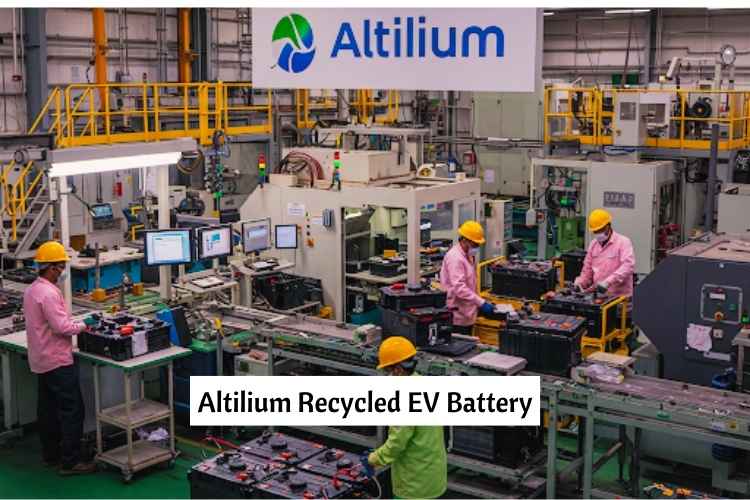Altilium Recycled EV Battery Tests India May 2025: As India accelerates its transition to electric vehicles (EVS), the spotlight is on sustainable battery solutions. In May 2025, Altilium, a UK-based clean technology company, announced a significant breakthrough: their recycled cathode active materials (CAM) matched the performance of commercially available materials in high-nickel NMC 811 batteries. This development could be pivotal for India’s EV industry, which is grappling with the dual challenges of raw material scarcity and environmental concerns.

Table of Contents
Altilium Recycled EV Battery: Understanding Altilium’s Breakthrough
Altilium’s recycled CAM achieved a cycle cell capacity of 193 mAh· g¹, aligning closely with the 190–194 mAh· g¹ range typical for commercial CAM. This was confirmed through electrochemical testing and X-ray diffraction (XRD) analysis, which showed the recycled CAM’s structure to be indistinguishable from that of commercial variants.
The company’s proprietary EcoCathode™ process enables the recovery of over 95% of critical metals, including lithium, from spent batteries. This process not only ensures high-quality material recovery but also significantly reduces greenhouse gas emissions by up to 74% compared to traditional methods.
Implications for Altilium Recycled EV Battery India’s EV Industry
India’s EV market is expanding rapidly, with a growing need for sustainable and efficient battery solutions. Altilium’s technology offers several benefits:
- Environmental Impact: By reducing reliance on newly mined materials, the EcoCathode™ process lowers the carbon footprint of battery production.
- Resource Efficiency: Recovering critical metals from used batteries addresses the issue of raw material scarcity.
- Cost Reduction: Recycling reduces the costs associated with sourcing and processing virgin materials.
These advantages align with India’s goals of promoting sustainable manufacturing and reducing environmental degradation.
Collaborative Efforts and Future Prospects
Altilium is collaborating with the UK Battery Industrialisation Centre (UKBIC) to produce battery cells using its recycled CAM, aiming for validation with leading automotive OEMS. Such partnerships are crucial for scaling up production and integrating recycled materials into mainstream battery manufacturing.
In India, similar collaborations could accelerate the adoption of recycled battery materials. Companies like Tata Chemicals and RecycleKaro are already making strides in lithium-ion battery recycling, recovering valuable metals with high efficiency. Integrating Altilium’s technology could further enhance these efforts, contributing to a robust circular economy in the EV sector.
Conclusion
Altilium’s successful testing of recycled CAM marks a significant milestone in sustainable battery technology. For India, adopting such innovations is not just beneficial but essential for meeting its ambitious EV targets and environmental commitments. By embracing advanced recycling processes, India can ensure a greener, more sustainable future for its transportation sector.
Bhakti Rawat is a Founder & Writer of InsureMyCar360.com. This site Provides You with Information Related To the Best Auto Insurance Updates & comparisons. 🔗
